Tajikistan
For many years I lived under the nonsensical assumption that there was nothing interesting in Tajikistan and that the high mountains there are mostly a barren rocky desert. It is only when I encounter reality that the true face of this incredible country is revealed to me. The arid brown-coloured mountains are indeed present in Tajikistan, but their peaks are covered with glaciers, the valleys hide lakes with waters so blue that you can't believe the colour, and the slopes are covered with forests of tusks with twisted trunks. At least that's the case in the western end of the Fann Mountains. The motivation to venture further east into the Pamirs is now all the greater.
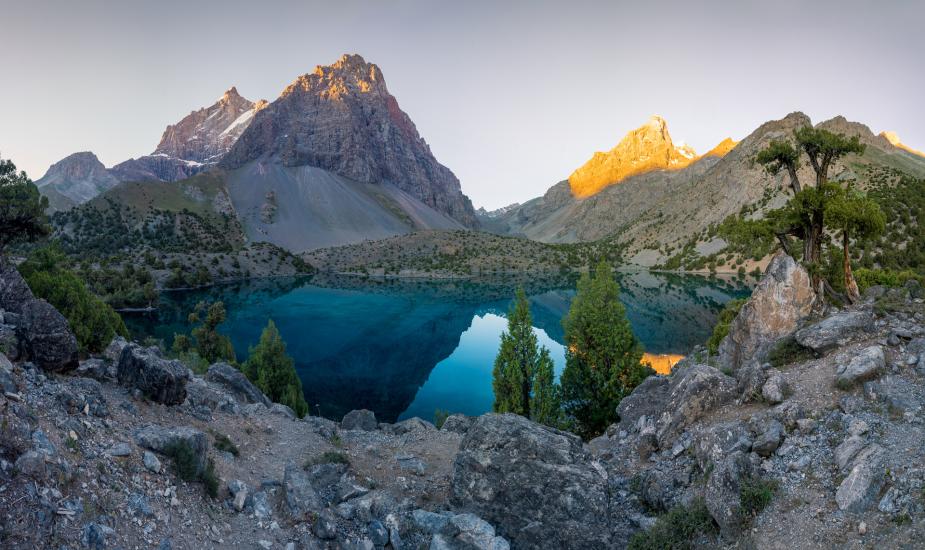
In the heart of the Fann Mountains: the glaciated Chapdara (5049 m), Polytechnik (4241 m), the most sunlit Adamtash (4579 m) and behind it the peak of Mirali (5106 m) peeking above the blue surface of Alauddin Lake. It is difficult to grasp the monumentality of the local mountains, only to the top of Polytechnik it is another 1500 metres from the surface; to the top of Chapdara it is 700 more.
Fann Mountains
In the heart of the Fann Mountains: the glaciated Chapdara (5049 m), Polytechnik (4241 m), the most sunlit Adamtash (4579 m) and behind it the peak of Mirali (5106 m) peeking above the blue surface of Alauddin Lake. It is difficult to grasp the monumentality of the local mountains, only to the top of Polytechnik it is another 1500 metres from the surface; to the top of Chapdara it is 700 more.
- Camera used: SONY ILCE-7C
- Exposure time: 1/4 s
- Aperture: f/11.0
- Focal length: 20mm
- ISO: 100
- Date taken: Jul 11, 2023 01:13:13
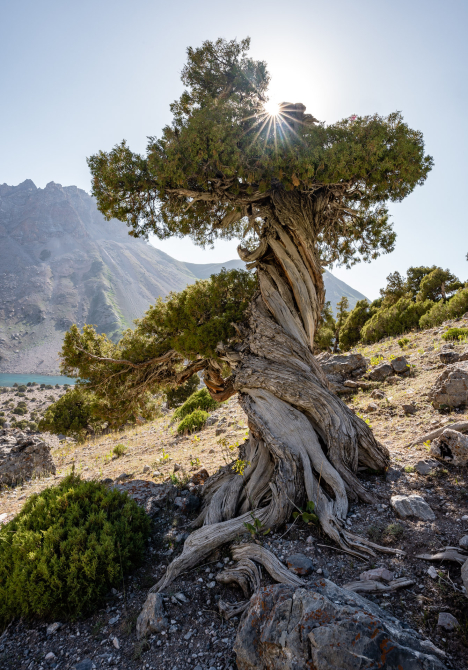
The descent to Lake Dushokha is practically unaccompanied by paths. The main trail turns north to Lake Bibijonat, here you continue more or less freely through the terrain. However, the trees in the immediate vicinity are so interesting (perhaps the most beautiful in the entire Fann Mountains) that I move from one to the next, exploring possible compositions. This old giant catches my eye from afar with its jagged crown and twisted trunk. A closer look reveals also the twisted roots. I compose the sun in the shade with the branches, this way it conjures up a beautiful star.
Old giant tree
The descent to Lake Dushokha is practically unaccompanied by paths. The main trail turns north to Lake Bibijonat, here you continue more or less freely through the terrain. However, the trees in the immediate vicinity are so interesting (perhaps the most beautiful in the entire Fann Mountains) that I move from one to the next, exploring possible compositions. This old giant catches my eye from afar with its jagged crown and twisted trunk. A closer look reveals also the twisted roots. I compose the sun in the shade with the branches, this way it conjures up a beautiful star.
- Camera used: SONY ILCE-7C
- Exposure time: 1/30 s
- Aperture: f/14.0
- Focal length: 20mm
- ISO: 100
- Date taken: Jul 11, 2023 12:45:46
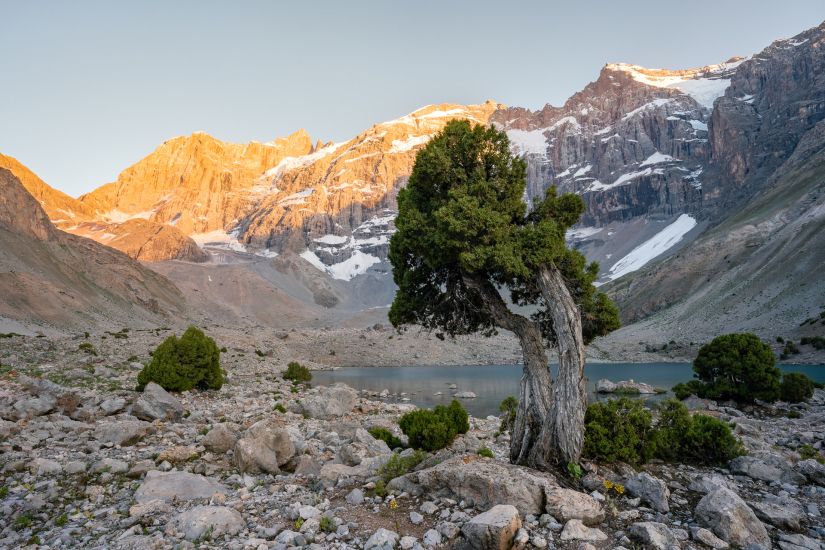
The shores of Lake Dushokha are covered with a fairy-tale "forest". Sparse trees with twisted trunks grow right out of the bare rocky rubble and their green crowns contrast sharply with the otherwise greyish brown landscape. Meanwhile, the peaks of Adamtash, Promezhutochnyj, Mirali and Marija reflect the last orange rays of the sun.
At the shores of Lake Dushokha
The shores of Lake Dushokha are covered with a fairy-tale "forest". Sparse trees with twisted trunks grow right out of the bare rocky rubble and their green crowns contrast sharply with the otherwise greyish brown landscape. Meanwhile, the peaks of Adamtash, Promezhutochnyj, Mirali and Marija reflect the last orange rays of the sun.
- Camera used: SONY ILCE-7C
- Exposure time: 1/20 s
- Aperture: f/11.0
- Focal length: 20mm
- ISO: 100
- Date taken: Jul 11, 2023 15:32:49
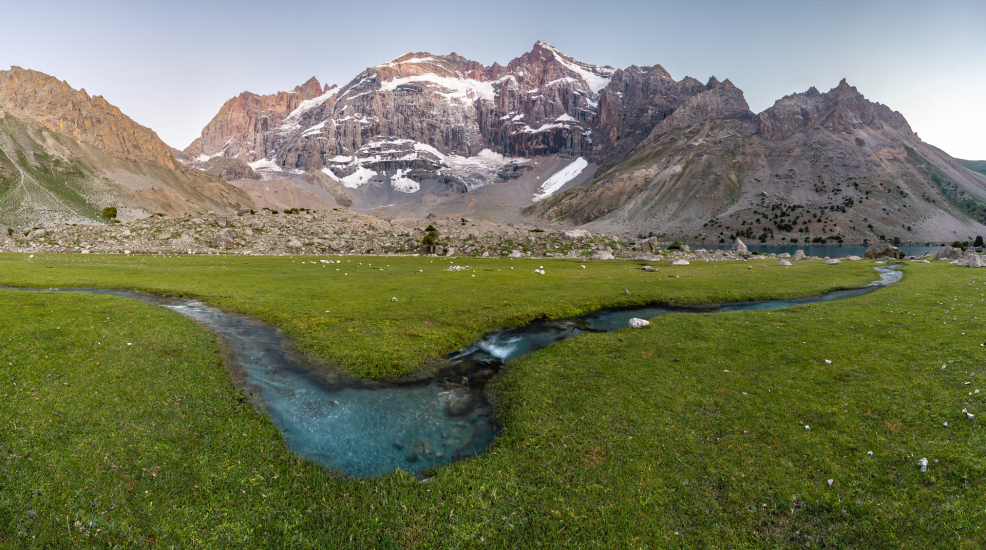
A stream meanders through the middle of the flat pasture towards the waters of Lake Dushokha. It cuts into the meadow like a winding snake, surprisingly as deep as wide. Where its flow slows, its blue colour stands out above the white pebbles. It is here that I select one of the bends and capture a panorama consisting of six portrait photographs so that the 5106 meters high Mirali forms a counterbalance to one of the meanders.
The stream at Lake Dushokha
A stream meanders through the middle of the flat pasture towards the waters of Lake Dushokha. It cuts into the meadow like a winding snake, surprisingly as deep as wide. Where its flow slows, its blue colour stands out above the white pebbles. It is here that I select one of the bends and capture a panorama consisting of six portrait photographs so that the 5106 meters high Mirali forms a counterbalance to one of the meanders.
- Camera used: SONY ILCE-7C
- Exposure time: 1/2 s
- Aperture: f/9.0
- Focal length: 20mm
- ISO: 100
- Date taken: Jul 11, 2023 15:49:49
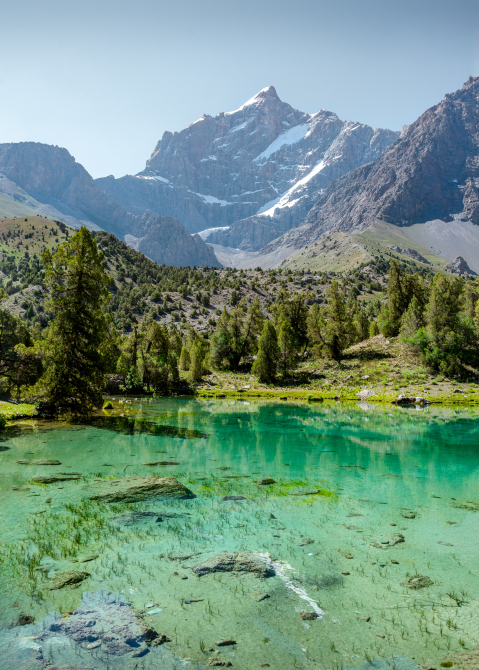
The lowest of the Alauddin lakes, Lake Dushuba, lies well below the tree line. Thanks to its green grass and vegetation, it has the most fairy-tale-like appearance of all. High above the water's surface, the 5,049-meter-high wall of Chapdara rises like a giant crystal.
Chapdara
The lowest of the Alauddin lakes, Lake Dushuba, lies well below the tree line. Thanks to its green grass and vegetation, it has the most fairy-tale-like appearance of all. High above the water's surface, the 5,049-meter-high wall of Chapdara rises like a giant crystal.
- Camera used: SONY ILCE-7M2
- Exposure time: 1/400 s
- Aperture: f/7.1
- Focal length: 28mm
- ISO: 100
- Date taken: Jul 10, 2023 05:53:13
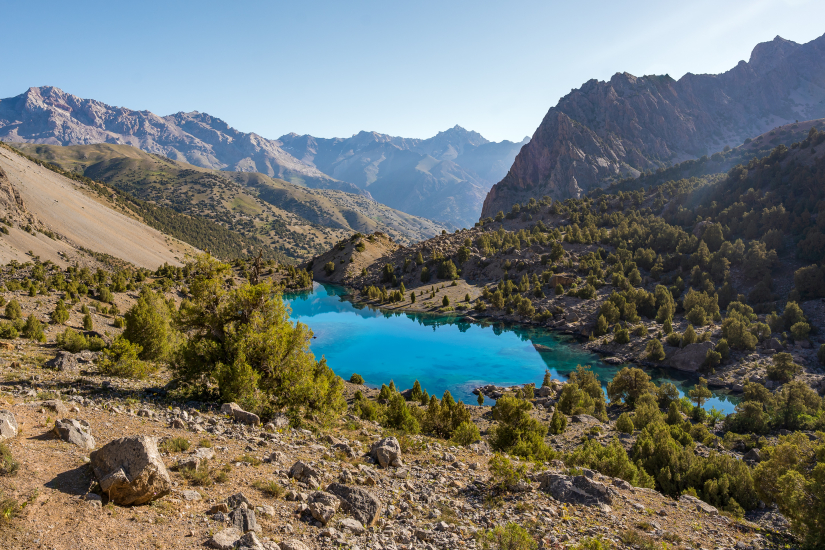
The lake, whose name literally translates as "sweet perfume," is located below the main Alauddin Lake. In the morning light, the contours of the surrounding arid mountains frame the lake, which, although it does not smell sweet, attracts visitors with its incredible blue color.
Morning on Shirparfom lake
The lake, whose name literally translates as "sweet perfume," is located below the main Alauddin Lake. In the morning light, the contours of the surrounding arid mountains frame the lake, which, although it does not smell sweet, attracts visitors with its incredible blue color.
- Camera used: SONY ILCE-7C
- Exposure time: 1/250 s
- Aperture: f/8.0
- Focal length: 20mm
- ISO: 100
- Date taken: Jul 11, 2023 03:19:27
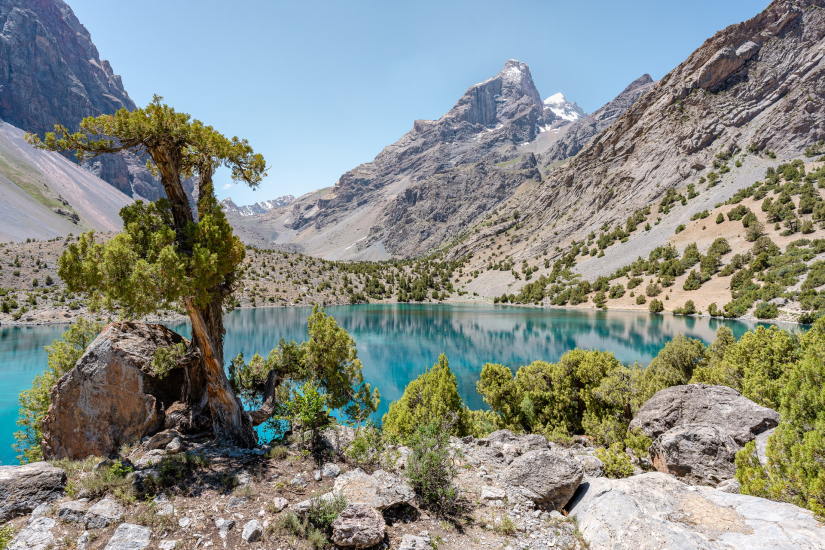
Of all the lakes in the Fann Mountains, Lake Alauddin is probably the most admired. It may not be the largest of the many lakes here, but it is renowned for its exceptional blue colour. It stands out most in full sunlight, when it contrasts with the brown of the mountains and the sparse growth of ancient tussock. One of them particularly appeals to me. I return to its double trunk and layered crown time and again.
Blue water of Alauddin lake
Of all the lakes in the Fann Mountains, Lake Alauddin is probably the most admired. It may not be the largest of the many lakes here, but it is renowned for its exceptional blue colour. It stands out most in full sunlight, when it contrasts with the brown of the mountains and the sparse growth of ancient tussock. One of them particularly appeals to me. I return to its double trunk and layered crown time and again.
- Camera used: SONY ILCE-7C
- Exposure time: 1/320 s
- Aperture: f/7.1
- Focal length: 20mm
- ISO: 100
- Date taken: Jul 10, 2023 07:35:50
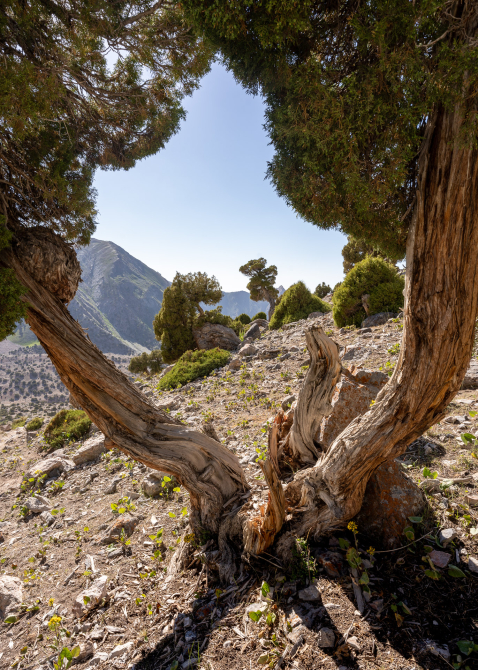
In the shade of the old thuja trees of the Fan Mountains, it is possible to stop for a moment and hide from the relentlessly scorching sun. However, the twisted trees offer not only shade but also extraordinary vistas, often opening up a whole new angle of view of the mountains around. You just have to get close enough.
Thuja views
In the shade of the old thuja trees of the Fan Mountains, it is possible to stop for a moment and hide from the relentlessly scorching sun. However, the twisted trees offer not only shade but also extraordinary vistas, often opening up a whole new angle of view of the mountains around. You just have to get close enough.
- Camera used: SONY ILCE-7C
- Exposure time: 1/60 s
- Aperture: f/11.0
- Focal length: 20mm
- ISO: 100
- Date taken: Jul 11, 2023 12:19:27
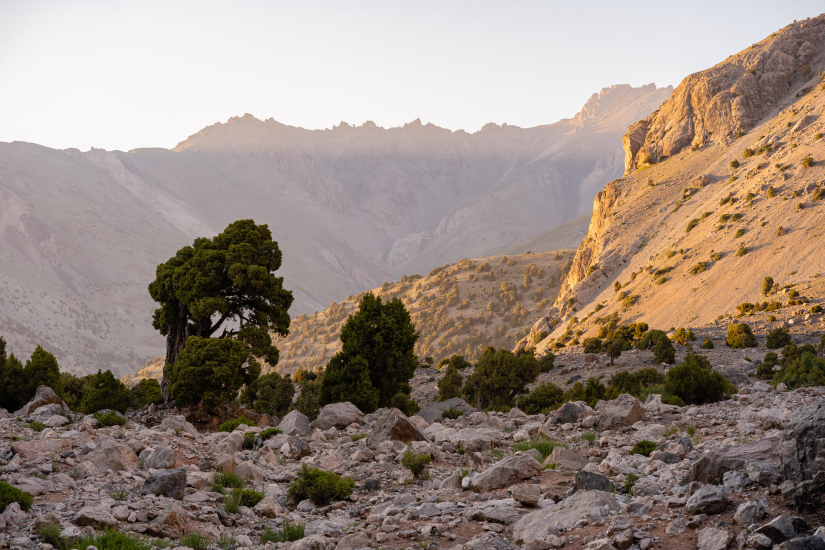
The sparse thuya forests offer an infinite number of views in which sometimes the mountains in the background stand out more and sometimes the trees themselves. Just look around, there are interesting compositions at every turn. In the evening, the view towards the lower, deserted mountains bathed in sunlight, and especially their sparsely vegetated slopes, catch my eye.
Sunset in the Fann Mountains
The sparse thuya forests offer an infinite number of views in which sometimes the mountains in the background stand out more and sometimes the trees themselves. Just look around, there are interesting compositions at every turn. In the evening, the view towards the lower, deserted mountains bathed in sunlight, and especially their sparsely vegetated slopes, catch my eye.
- Camera used: SONY ILCE-7C
- Exposure time: 1/20 s
- Aperture: f/8.0
- Focal length: 90mm
- ISO: 100
- Date taken: Jul 11, 2023 15:21:22
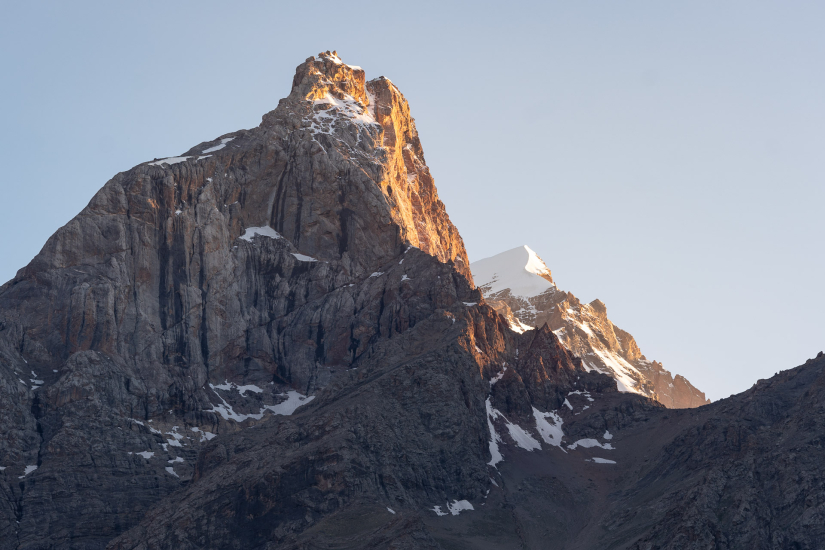
The peaks in the vicinity are tinged with orange, yet soft light in the evening. I like the light conditions the most on Adamtash peak (4579 m) and Mirali (5106 m) hiding behind it. I can see this view right from my tent, deep in the valley below the aforementioned peaks.
Tajik peaks
The peaks in the vicinity are tinged with orange, yet soft light in the evening. I like the light conditions the most on Adamtash peak (4579 m) and Mirali (5106 m) hiding behind it. I can see this view right from my tent, deep in the valley below the aforementioned peaks.
- Camera used: SONY ILCE-7C
- Exposure time: 1/60 s
- Aperture: f/5.6
- Focal length: 90mm
- ISO: 100
- Date taken: Jul 10, 2023 15:30:03
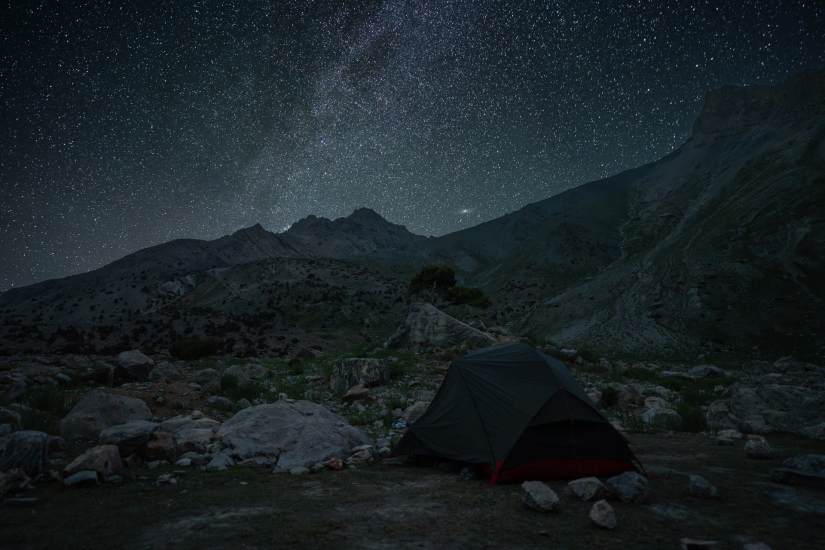
A tent by the lake Dushokha, right behind it my favourite tree growing out of a big boulder. At night I force myself out of the tent, immediately drawn to the glowing sky. One of the places where the Milky Way is still easily visible to the eye. Surprised by the unusual warmth, I can move around outside and stand in short sleeves without discomfort, even though just above the lake, the glaciated peaks rise.
Tajik night
A tent by the lake Dushokha, right behind it my favourite tree growing out of a big boulder. At night I force myself out of the tent, immediately drawn to the glowing sky. One of the places where the Milky Way is still easily visible to the eye. Surprised by the unusual warmth, I can move around outside and stand in short sleeves without discomfort, even though just above the lake, the glaciated peaks rise.
- Camera used: SONY ILCE-7C
- Exposure time: 30/1 s
- Aperture: f/1.8
- Focal length: 20mm
- ISO: 1600
- Date taken: Jul 11, 2023 19:23:59
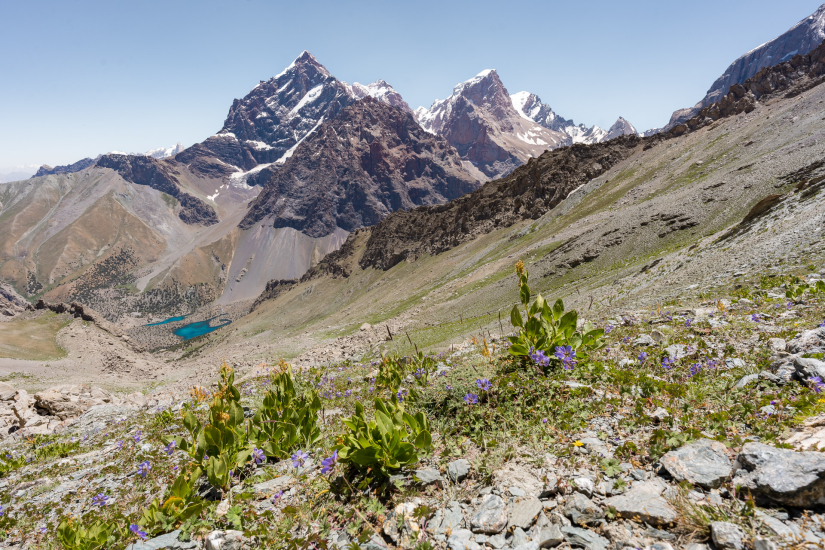
The 1000 vertical metres from the lake to the edge of the pass leads first through sparse yew forests, but mostly on arid rocky plains. Not far below the saddle, however, a small stream springs up, near which the landscape blooms with a profusion of plants. From here, apart from Chapdara, two other five-thousanders can be seen: Bodchona and Zamok.
Path to Alauddin Pass
The 1000 vertical metres from the lake to the edge of the pass leads first through sparse yew forests, but mostly on arid rocky plains. Not far below the saddle, however, a small stream springs up, near which the landscape blooms with a profusion of plants. From here, apart from Chapdara, two other five-thousanders can be seen: Bodchona and Zamok.
- Camera used: SONY ILCE-7C
- Exposure time: 1/200 s
- Aperture: f/10.0
- Focal length: 20mm
- ISO: 100
- Date taken: Jul 11, 2023 08:29:12
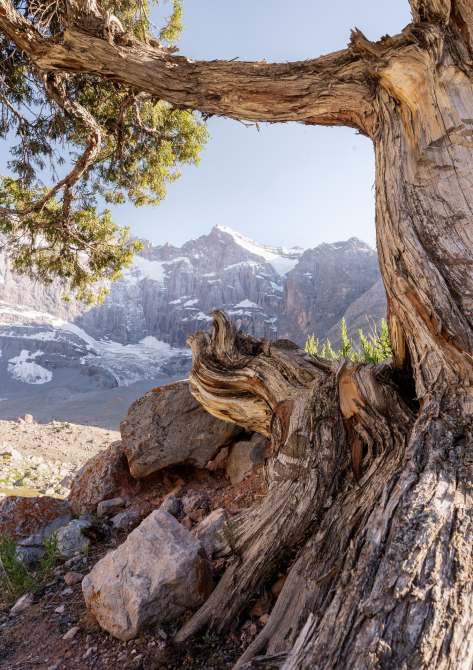
We set up our tent by the lake Dushokha in the late afternoon. Immediately I am attracted by the twisted thuja tree overgrowing a boulder nearby. Gradually I get closer and look for the optimal composition. In the end it is the closest one - a low branch from above frames the view of the glaciated mountains, the stump from below seems to point towards the most prominent peak. I also return here in the evening and morning when the mountains have turned orange, but the tree is already completely in shade. That's why I like this first version best, capturing the brightness of a hot afternoon.
A twisted tree
We set up our tent by the lake Dushokha in the late afternoon. Immediately I am attracted by the twisted thuja tree overgrowing a boulder nearby. Gradually I get closer and look for the optimal composition. In the end it is the closest one - a low branch from above frames the view of the glaciated mountains, the stump from below seems to point towards the most prominent peak. I also return here in the evening and morning when the mountains have turned orange, but the tree is already completely in shade. That's why I like this first version best, capturing the brightness of a hot afternoon.
- Camera used: SONY ILCE-7C
- Exposure time: 1/20 s
- Aperture: f/11.0
- Focal length: 20mm
- ISO: 100
- Date taken: Jul 11, 2023 13:58:54
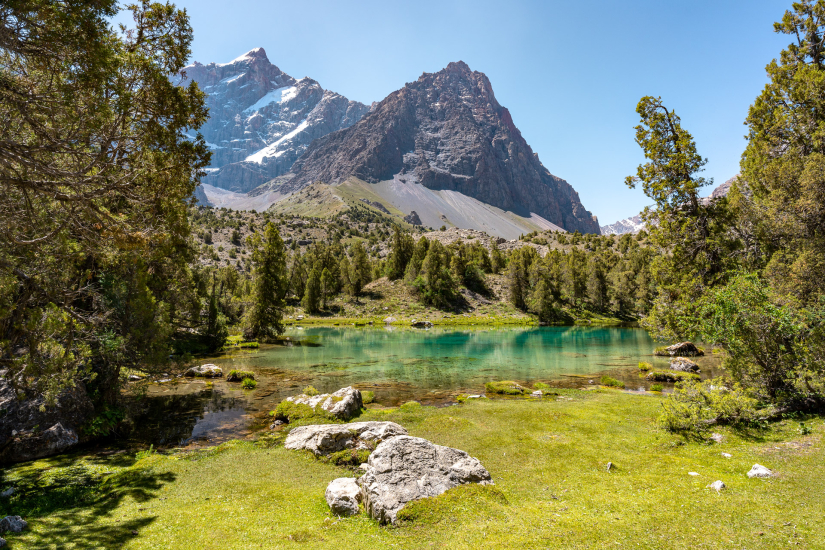
Unlike the other lakes higher up in the Fann Mountains, Duchuba lies slightly below the upper forest boundary. This means that the mature thuja trees lean over the water in all directions and the shores of the lake are covered with an idyllic stand of lush grass. This creates an oasis of relaxation in the otherwise mostly dry surroundings.
Duchuba lake
Unlike the other lakes higher up in the Fann Mountains, Duchuba lies slightly below the upper forest boundary. This means that the mature thuja trees lean over the water in all directions and the shores of the lake are covered with an idyllic stand of lush grass. This creates an oasis of relaxation in the otherwise mostly dry surroundings.
- Camera used: SONY ILCE-7C
- Exposure time: 1/250 s
- Aperture: f/8.0
- Focal length: 20mm
- ISO: 100
- Date taken: Jul 10, 2023 06:29:58